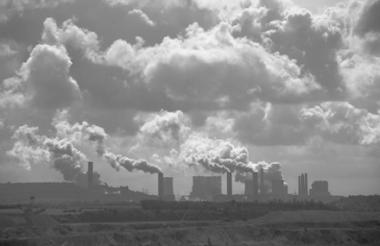While the world’s attention has focused on the Covid-19 pandemic and its devastating effects on medical systems, communities and employment, the creeping threats of climate and ecological breakdown gather pace.
Prior to the pandemic, many considered climate change to be the most imminent global risk, with some arguing for a more bullish push, stating that the UK must achieve net-zero carbon emissions by 2030 rather than the agreed 2050 date. This would require an immediate and radical approach, such as plane travel becoming rare, gas boilers all converted to electric, building 13,000 new wind turbines and a significant decline in meat and dairy intake – to name a few changes that would be needed. Undoubtedly, all carbon intensive industry – such as mining and fossil fuel extraction – would immediately stop. Given the obvious logistical concerns and the ensuing mass unemployment, 2050, though slow, seems more realistic.
Thankfully, while the distant 2050 deadline has been factored into the UK industrial strategy we anticipate significant improvement in this area much sooner. Projections suggest job growth of more than two million green collar jobs and an increase in low carbon exports amounting to more than £170bn by 2030. The siren call that is global growth is encouraging significant investment in green and low carbon areas faster than glacial government deadlines.
While new jobs and new industry are compelling headlines, what about the people and their communities which, for generations, were dependent upon the old industries? Many recall the Northern mining villages in the 1970s and 80s, where coal families saw their livelihoods and communities destroyed. Achieving a more environmentally responsible world doesn’t just create a flotsam of abandoned industries but towns drained of investment giving the people who live and work there no choice but the poverty line. Can we work for workers and still protect the environment?
Charities whose missions are interwoven with concepts of social justice, the eradication of poverty, and employee benevolence and assistance often struggle, morally, to integrate climate change and ecological collapse into their social focus. Here, the concept of a “just transition” can help frame their investment direction and alleviate some of those concerns.
Just Transition is a framework for acknowledging that the rapid shift to a net-zero economy ought to be done in a way that is sensitive to those communities that derive their existence from carbon intensive industry. Its movement is deliberate and purposeful towards a renewable future while emphasising investment in people and communities through upskilling and reskilling. It exemplifies the evolution of an existing workforce – alongside new job creation – through education ensuring employees stay relevant and, most importantly, employed.
Though one might expect a reticence to change, there are encouraging signs. Surveys of workers in carbon-intensive industries around the world repeatedly show a willingness or desire for reskilling and new, secure jobs in renewable energy. This has successfully played out in Germany’s Ruhr region, for example, where the city of Gelsenkirchen transitioned in two decades from a reliance on the mining industry to other alternative activities by building a science centre specialised in developing new technologies for energy efficiency using solar energy and clean fuels. This has created over 26,000 new jobs.
So when this framework is translated into a charity’s investment portfolio what makes a Just Transition portfolio different? To start, it might have some surprising holdings. Many find it hard to believe that the biggest investors into green and responsible technology are often power and waste companies. For example, in Italy, power company Enel has moved towards a sustainable platform and estimates that by 2030 a Just Transition strategy in the electricity sector could see €14–23bn in revenue for Italy and up to 1.4m new jobs across the EU. In the UK, waste management giant Biffa, which collects 15,000 tonnes of waste daily, has a 10-year plan with three strategic pillars: building a circular economy, tackling climate change and caring for their people and their communities.
It has invested in plastic bottle recycling plants in North-East England (Seaham and Washington), enabling them to recycle over 1.3bn PET milk bottles a year, with plans to quadruple capacity by 2030. Today, over 85% of the milk bottles in the UK now contain recycled Biffa material. Additionally, the plan is to deliver £25m to local community and UK partnership schemes projects and to be recognised as a top-ranked employer.
As popular thought, and government regulation, moves more towards renewable energy these companies are using their reserves to explore the best choices for future energy use and financial sustainability. This research and development requires new and transitional skills which lead to both job creation and reskilling a work force who can bridge existing product lines and future opportunities. In a stark difference from the historic imagery of billowing smoke stacks and appalling working conditions, many modern companies have proven they can be profitable while being environmentally and socially responsible.
While there is always a place for encouraging rapid change – especially where climate change is concerned – it is reassuring for charities who value social equality and just business activity that people and communities need not be forgotten. Just Transition offers a framework to invest responsibly while helping people achieve a more prosperous future.
Caroline Jarvis Gee is charity business development manager at EdenTree
Charity Finance wishes to thank EdenTree for its support with this article








